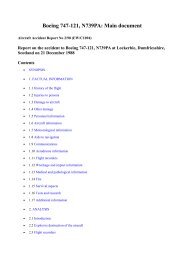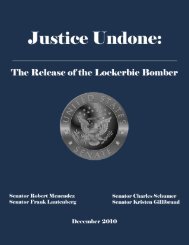REPORT OF THE - Archives - Syracuse University
REPORT OF THE - Archives - Syracuse University
REPORT OF THE - Archives - Syracuse University
You also want an ePaper? Increase the reach of your titles
YUMPU automatically turns print PDFs into web optimized ePapers that Google loves.
against foreign international airports and the international aviation industry in general.<br />
The Act draws its ultimate authority from the U.S. sovereign right to control landing<br />
rights in this country.<br />
The Act directs the Secretary of Transportation to conduct periodic security assessments<br />
of foreign international airports used by American carriers and airports from which<br />
foreign carriers last depart to the United States. These assessments are measured against<br />
the minimum standards set by ICAO.<br />
The Secretary of Transportation, in conducting these assessments under the Foreign<br />
Airport Assessment Program, must consult with the Secretary of State on the extent of<br />
the terrorist threat in each country. If the assessment determines that an airport's security<br />
procedures are deficient, the Secretary of Transportation notifies the foreign government.<br />
This occurs after advising the Secretary of State. The notification includes recommended<br />
steps necessary to correct the deficiencies.<br />
A finding of deficiency sets in process a 90-day period during which the foreign<br />
government must bring its airport up to standard. If it fails to do so, the Act imposes a<br />
series of sanctions:<br />
the Secretary of State must issue a travel advisory;<br />
the identity of the airport must be published in the Federal Register;<br />
the decision must be advertised publicly; and<br />
a travel advisory must be included with all tickets between the United States and that<br />
airport.<br />
All assistance under the Foreign Assistance Act of 1961 and the Arms Export Control<br />
Act to that country may also be suspended.<br />
In addition to the 90-day process, the Act provides for immediate notification, issuance of<br />
the travel advisory, and suspension of air service to any airport if the Secretary of<br />
Transportation determines that a condition exists which threatens the safety and security<br />
of passengers, crews or aircraft.<br />
A total of 247 foreign airports in 99 countries currently must be assessed under the<br />
program. The FAA's goal is to assess each of these annually, typically involving a threeto<br />
five-day visit by a two-member team. Severe FAA personnel shortages generally limit<br />
the depth of these assessments to interviews and observations. The FAA regional office<br />
in Brussels for Europe, Africa, and the Middle East, for instance, has a staff of 13 to<br />
cover 42 countries and 123 airports. Inspectors do not substantively test the operational<br />
effectiveness of security procedures. The FAA inspectors do, however, describe in detail<br />
the security measures in place for each ICAO standard.<br />
Since the program began in 1986, the FAA has conducted 957 foreign airport<br />
assessments and made 1,082 recommendations. Significantly, only four assessments<br />
triggered the 90-day period; and only in one case, Manila in 1986, were the sanctions<br />
invoked.<br />
According to FAA officials, in most cases the foreign airports move immediately to<br />
correct deficiencies and to implement improvements. When a 90-day countdown does<br />
begin, FAA calls upon the assistance available from other U.S. agencies and ICAO to<br />
facilitate improvements. The Foreign Airport Security Act, therefore, generates security<br />
compliance and improvements in a low-key and generally cooperative fashion.










